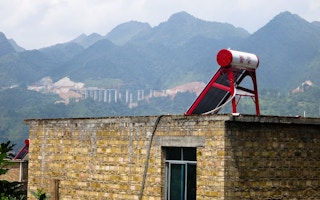As we approach the Year of the Rat and begin a new 12-year cycle of the Chinese zodiac, three profound challenges face the world: how to build a more stable and efficient trading system, tackle climate change, and protect biodiversity.
China has a pivotal role to play in all three. As the world’s second-largest economy, China’s evolving trade relations, especially with the United States, have huge global economic implications.
As one of the world’s largest greenhouse gas emitters, China’s actions will be carefully monitored as countries are scheduled to meet in Glasgow, Scotland, in November for the next major international climate conference. And as host of the most important international conference on biodiversity in decades, China is expected to make concrete commitments to move this agenda forward. What may be less apparent is that the three challenges are interlinked.
One bold response to all three is for China to make its supply chains more environmentally and socially sustainable, especially for agricultural commodities such as soy, beef, palm oil and timber.
Why is this important?
Global demand for these commodities, often sourced from tropical countries, is surging as population and affluence increase. This is causing significant forest loss and degradation: roughly 40 per cent of tropical deforestation over the past decade is a result of expansion in agriculture. This loss of forest cover, along with the impact of other agriculture production and land use, in turn, contributes about 23 per cent to global greenhouse gas emissions.
A stable climate is not the only casualty. One million animal and plant species are now threatened with extinction, more than ever before in human history, according to a 2019 UN report. The climate and Earth’s living web of nature are the planet’s “operating systems,” and their disruption poses massive threats to human well-being and development.
Sustainable production of commodities depends on the ecosystem services that a healthy environment provides, including soil formation and retention, water quantity and quality, and natural pest controls. Deforestation can disrupt these vital processes and impede production.
So it is in China’s interest to invest in commodity supply chains that are stable and sustainable over the long run, and China’s government agencies and businesses are currently considering how to move in this direction.
Why China?
Nearly two years ago, China integrated the concepts of “ecological civilisation” and “a community of shared future for mankind” into its Constitution. It can now bring these concepts to life by focusing on its supply chains. As the world’s largest importer of soybeans, timber and beef, China’s motivation to shift decisively toward greening its supply chains is both economic and political.
First, the economic argument. Consumer preferences in China and around the world are rapidly changing toward more sustainable commodities. Many governments are adopting more stringent environmental standards for imports of commodities.
“
It is in China’s interest to invest in commodity supply chains that are stable and sustainable over the long run.
Businesses and investors are also embracing sustainability criteria, recognising that conducting business as usual is not in their self-interest. For example, the New York Declaration on Forests and the Tropical Forest Alliance bring together national and subnational governments, multinational companies, indigenous community groups and non-governmental organisations with the aim to halt deforestation.
The Consumer Goods Forum, an international business group with some 400 members, has resolved to achieve net-zero deforestation.
This creates a risk for countries and companies not able to respond nimbly to these changing policies and attitudes, while offering an exciting market opportunity for those able to demonstrate that their procurement or production of commodities is green.
Timber is a case in point. In 2008, the US amended its laws to ban the trade of illegally sourced wood, while in the last decade, the European Union, Australia, Japan and the Republic of Korea have adopted similar legislation. China can get ahead of this wave by ensuring the timber and other commodities it procures are legal and thus promote its economic interests.
Second, the political argument. At a time when the international community is looking for leadership, greening value chains could generate significant political dividends for China. This stance can help position China positively in support of global environment and development agreements, including around the sustainable development goals, climate change, and biodiversity. The reputational upside for China to move in this direction should not be underestimated.
China is in a position to make a meaningful difference on these issues, advancing its own interests while at the same time promoting the concept of an ecological civilisation globally.
There are steps China can take relatively easily including adjusting policy and legal measures to incentivise greener supply chains; integrating green criteria into trade, investment and finance; and using its growing development assistance portfolio to assist countries producing these commodities in achieving their own greening objectives. China’s economic power means that steps to green its value chains will encourage other countries to do the same.
In 2020, China has several opportunities to demonstrate its growing global leadership on pressing environmental challenges. This is going to be a big year for China and the world. It demands big ideas from all of us.
Manish Bapna is the executive vice president and managing director of the World Resources Institute. This article was originally published on the WRI blog.









